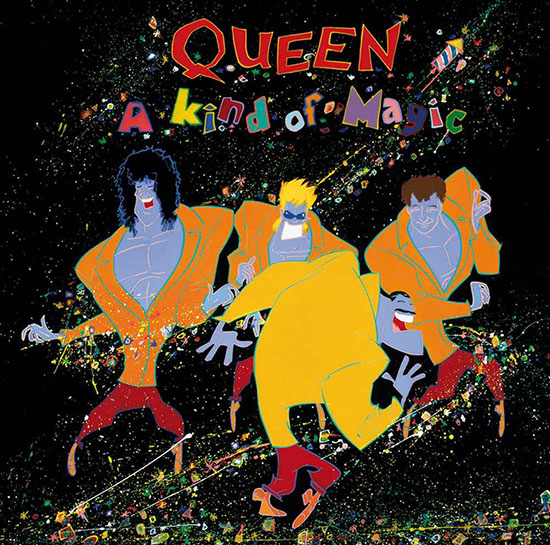
“The film needed their energy.” Russell Mulcahy– Director Highlander
Queen’s twelfth studio album was recorded between September 1985 and April 1986, at three different studios: Town House (London), Musicland (Munich) and Mountain Studios (Montreux). The project began life as the soundtrack to the motion picture Highlander, after director Russell Mulcahy had commissioned a handful of tracks from Queen. He regarded them as the ideal band for the task and would later comment that it was always Queen he had in mind because of their strong, anthemic songs. The band was so impressed with the first 20 minutes of rough footage they were shown, that further tracks soon followed and the A Kind Of Magic album was born.
Each band member was inspired by different parts of the story and in evidence the album covers a wide spectrum of emotion. The songs are full of references to the film dialogue and its main characters and events – There can be only one! / No mortal man can win this day / The prize / It’s a kind of magic / Don’t lose your head.
Brian was greatly moved by the death of Heather in the film (the main character’s first and greatest love) and by the dialogue surrounding her final moments as she lay dying in the arms of her beloved MacLeod – the immortal Highlander – on the spectacular Scottish highland. MacLeod is destined to be without Heather for the rest of time and suddenly the prospect seems impossible to face. Who Wants To Live Forever is the song that emerged from this poignant moment of the movie, written by Brian on the drive home after viewing the first assembly footage.
Roger, meanwhile, was taken with the lines “There can be only one!” and “It’s a kind of magic!” – later giving rise to his song of similar name. The battles in Highlander have been raging through many centuries and are only now, in the 1980s, coming to a head. This aspect too is covered in the song.
The main characters of the story, most notably The Highlander Connor MacLeod and his nemesis The Kurgan, have been relentlessly battling through the ages in order to secure the ultimate reward, the greatest prize of all, immortality (and some degree of peace, finally). Around this concept, Brian conceived his song Gimme The Prize. There is only one way to win the prize, however, and that is to be the last man standing, achievable only by the grim process of beheading all opponents – because ‘There can be only one!’ Another Roger song, Don’t Lose Your Head (featuring incidental vocals from English vocalist Joan Armatrading), emerges from this idea, a recurring theme as the film builds and each warrior inevitably meets his gruesome end until only two are left for the finale confrontation.
Freddie’s anthemic Princes Of The Universe (the proposed original title of the film) is a typical no-nonsense piece that, for release as a single in 1986, required an equally powerful video. What emerged was a startling screen duel between actor Christopher Lambert recreating his Highlander role, complete with head-dispensing sword, and Freddie, armed only with the faithful microphone stand. The two do battle amid a scene of devastation, while Brian, Roger and John play on regardless. It is breathtaking footage, with Freddie looking even more menacing than the sword-wielding Highlander, and in which, thankfully, neither man is parted from his head.
Certain tracks on the Magic album are significantly different to those featured in the film, particularly the title track, as the band reworked the material after the Highlander post-production was completed. Renowned composer Michael Kamen provided the score for most of the incidental music throughout the film, and the rare combination of his original music and dynamic Queen songs from all four band members proved a formidable alliance.
Though it appeared six months ahead of the LP, in November 1985, One Vision (coupled with the non-album instrumental piece Blurred Vision) was the first single issued from the album. Produced by Queen and Mack and recorded at Musicland in Germany, it was notably the first Queen single written jointly by the band. Inspired by their acclaimed performance at Live Aid several months earlier, universally regarded as their greatest concert triumph of all, Queen returned to the studio with renewed vigor to come up with this much-loved track. The artwork for the single features a portrait taken by famous photographer David Bailey backstage at Live Aid, while the accompanying video was filmed in September at Musicland studios while the band were working on the album there. Shot over a period of weeks, the video offers a rare insight into Queen at work in the studio and also enjoying free time.
A Kind Of Magic was released on June 2nd, 1986 and entered the UK charts at No. 1. It achieved double Platinum status at home and abroad and it topped the charts in many other territories.
Click here to buy A Kind Of Magic on LP and CD, plus T-shirts and slipmats.